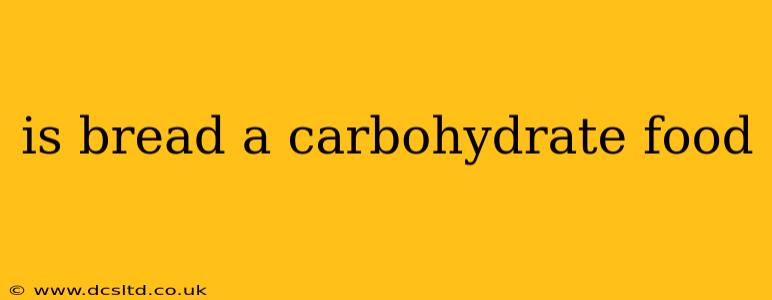Bread, a staple food across numerous cultures, is undeniably rich in carbohydrates. But understanding its carbohydrate content goes beyond a simple yes or no. This article will explore bread's carbohydrate composition, delve into the types of carbohydrates it contains, and address common questions surrounding its nutritional value.
What Types of Carbohydrates are in Bread?
Bread primarily consists of carbohydrates, but the type of carbohydrates significantly impacts its nutritional profile. The main carbohydrate sources in bread are:
-
Starch: This complex carbohydrate makes up the bulk of bread's carbohydrate content. Starch is broken down into glucose, providing the body with energy. The type of starch (e.g., from wheat, rye, or other grains) can influence how quickly the glucose is released into the bloodstream.
-
Sugars: Many bread recipes include added sugars, impacting the overall carbohydrate count and glycemic index (GI). These added sugars can be simple sugars like sucrose or more complex sugars depending on the recipe.
-
Fiber: While technically a carbohydrate, fiber is indigestible and doesn't raise blood sugar levels. Whole-grain breads generally contain more fiber than white bread, contributing to improved digestion and satiety. The type of grain used significantly influences the fiber content.
Is Bread a Healthy Carbohydrate Source?
The healthiness of bread depends heavily on its ingredients and type. Whole-grain breads, made from unrefined grains like whole wheat, rye, or oats, offer several health benefits:
-
Higher Fiber Content: This aids digestion, promotes regularity, and contributes to feelings of fullness, potentially helping with weight management.
-
More Vitamins and Minerals: Whole grains retain more nutrients during processing compared to refined grains.
-
Lower Glycemic Index: The slower release of glucose into the bloodstream helps prevent blood sugar spikes and crashes.
Conversely, white bread, made from refined flour, often contains:
-
Less Fiber: This can lead to less satiety and potentially contribute to blood sugar fluctuations.
-
Fewer Nutrients: The refining process removes many essential vitamins and minerals.
-
Higher Glycemic Index: The rapid release of glucose can cause blood sugar spikes.
What are the Different Types of Bread and Their Carbohydrate Content?
The carbohydrate content of bread varies significantly depending on the type:
-
White Bread: Generally higher in refined carbohydrates and lower in fiber.
-
Whole Wheat Bread: Higher in fiber and complex carbohydrates, offering more sustained energy release.
-
Rye Bread: Often contains higher fiber than white bread and a slightly different flavor profile.
-
Sourdough Bread: The fermentation process can alter the bread's structure and impact the digestibility of carbohydrates.
-
Gluten-Free Bread: Made from alternative flours like rice flour or almond flour, these breads have varying carbohydrate content depending on the specific ingredients.
How Many Carbohydrates Are in a Slice of Bread?
The carbohydrate content per slice of bread varies substantially depending on the type of bread and the slice size. Checking the nutrition label on the packaging is crucial for accurate information. Generally, a slice of white bread contains approximately 15 grams of carbohydrates, while a slice of whole-wheat bread may contain slightly more due to the added fiber.
Does Bread Make You Gain Weight?
Bread itself doesn't directly cause weight gain. However, excessive consumption of bread, particularly refined bread with added sugars and limited fiber, can contribute to weight gain due to its high carbohydrate content and potential for blood sugar fluctuations. Moderation and choosing healthier bread options are key factors in managing weight.
In conclusion, while bread is fundamentally a carbohydrate food, its nutritional value is dramatically influenced by its type and ingredients. Opting for whole-grain options with minimal added sugars provides a more nutritious and balanced carbohydrate source. Always check food labels to understand the carbohydrate content and make informed choices.
